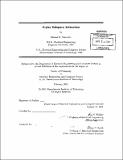Krylov subspace estimation
Author(s)
Schneider, Michael K. (Michael Klaus)
DownloadFull printable version (8.890Mb)
Other Contributors
Massachusetts Institute of Technology. Dept. of Electrical Engineering and Computer Science.
Advisor
Alan S. Willsky.
Terms of use
Metadata
Show full item recordAbstract
This thesis proposes a new iterative algorithm for the simultaneous computation of linear least-squares estimates and error variances. There exist many iterative methods for computing only estimates. However, most of these will not also compute error variances. A popular method for computing only estimates is the conjugate gradient algorithm. The algorithm proposed in this thesis for the simultaneous computation of estimates and error variances is a variant of the conjugate gradient algorithm for computing estimates. The convergence of the proposed algorithm is extensively characterized both analytically and experimentally. Variants of the proposed estimation algorithm are applied to two other statistical problems. The first is that of realization. Specifically, an iterative algorithm is developed for the simultaneous generation of a sample path of a given Gaussian random process and a low-rank approximation to the covariance matrix of a given process. The algorithm is compared to existing algorithms for realization in terms of an analytical estimate of computational cost and an experimental characterization of overall performance. The second statistical problem is that of space-time estimation. This thesis proposes an implementation of the Kalman filter and smoother in which each step of these recursive algorithms is solved iteratively. The resulting space-time estimation algorithm is especially suited for remote sensing problems. In particular, the algorithm is applied to the assimilation of measurements of sea surface height into a model of the ocean, the dynamics of which are given by a Rossby wave equation. Lastly, this thesis examines the stability of infinite-dimensional discrete-time Kalman filters of a type arising in remote sensing problems. This is accomplished by developing a Lyapunov theory for infinite-dimensional linear systems whose states are elements in a Hilbert space. Two theorems, proved in this thesis, provide sufficient conditions for the state trajectories to converge either strongly or weakly to 0. This general theory is then used to establish sufficient conditions for strong and weak stability of infinite-dimensional Kalman filters.
Description
Thesis (Ph.D.)--Massachusetts Institute of Technology, Dept. of Electrical Engineering and Computer Science, 2001. Includes bibliographical references (p. 151-156).
Date issued
2001Department
Massachusetts Institute of Technology. Department of Electrical Engineering and Computer SciencePublisher
Massachusetts Institute of Technology
Keywords
Electrical Engineering and Computer Science.